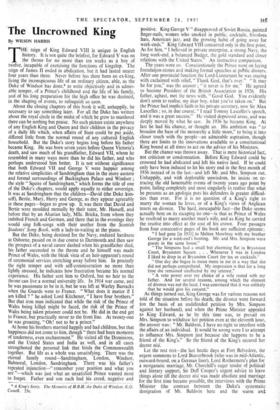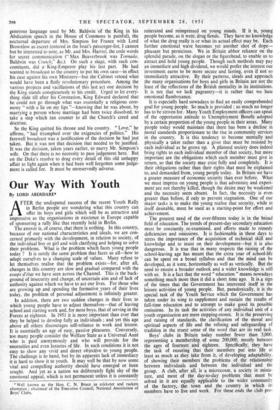The Uncrowned King
By WILSON HARRIS
THE reign of King Edward VIII is unique in English history. It is not quite the briefest, for Edward y was on the throne for no more than ten weeks as a boy of twelve, incapable of exercising the functions of kingship. The reign of James II ended in abdication, but it had lasted nearer four years than three. Never before has there been an ex-king, hying the inconspicuous life of an ordinary citizen, able, as the Duke of Windsor has done,* to write objectively and in admir- able temper, of a Prince's childhood and the life of his family, and of his long preparation for the high office he was destined, in the shaping of events, to relinquish so soon. About the closing chapters of this book it will, unhappily, be necessary to say something later. For all the Duke has written about the royal circle in the midst of which he grew to manhood there can be nothing but praise. No such picture exists anywhere of any English King and Queen and their children in the privacy of 'a daily life which, when affairs of State could be put aside, differed little from the normal round of any cultured English household. But the Duke's story begins long before his father became King. He was born seven years before Queen Victoria's death, and saw much of his grandfather, Edward VII, whom he resembled in many ways more than he did his father, and who perhaps understood him better. It is not without significance that both Edward VII and George V were happier among the relative simplicities of Sandringham than in the more austere and formal surroundings of Buckingham Palace and Windsor ; the style "Squire of Sandringham," which forms the title of one of the Duke's chapters, would apply equally to either sovereign. It was at Sandringham that the children—David (the Duke him- self), Bertie, Mary, Harry and George, as they appear agreeably in these pages—began to grow up. It, was there that David and Bertie were moulded mentally by their tutor, Mr. Hansel, and before that by an Alsatian lady, Mlle. Bricka, from whom they imbibed French and German, and there that in the evenings they would sing folk-songs with their mother from the Scottish Students' Song Book, with a lady-in-waiting at the piano.
But the 'Nice, being destined for the Navy, endured hardness at Osborne, passed on in due course to Dartmouth and then saw the prospect of a naval career dashed when his grandfather died, his father succeeded to the throne and he himself was made Prince of Wales, with the bleak Vista of,an heir-apparent's sound of ceremonial services stretching away before him. In precisely the right temper and with self-commiseration no more than lightly stressed, he indicates how frustration became his normal experience. His father sent him to Oxford, but no heir to the throne can live a normal university life. In 1914 war came, and he was passionate to be in it, but he was left at Warley Barracks when the Guards went to France. "What does it matter if I am killed ? " he asked Lord Kitchener, "I have four brothers." But that iron man indicated that while the risk of the Prince of Wales being killed might be faced, the risk of the Prince of Wales being taken prisoner could not be. He did in the end get to France, but practically never to the front line. At twenty-one he was groaning, "Oh! not to be a prince." At home his brothers married happily and had children, but that happiness did not come to him, though "there had been moments of tenderness, even enchantment." He visited all the Dominions, and the United States and India as _ well, and in all cases strengthened the personal link that binds the Commonwealth together. But life as a whole was unsatisfying. There was the eternal family round—Sandringham, London, Windsor, Balmoral, London, Sandringham.' There was his father's repeated injunction—" remember your position and what you are "—which was just what an unsatisfied Prince wanted most to forget. Father and son each had his creed, negative and A King's Story. The Memoirs of H.R.H. the Duke of Windsor, K.G. Cassell. 25s. positive. King George V " disapproved of Soviet Russia. painted finger-nails, women who smoked in public, cocktails, frivolous hats, American jazz, and the growing habit of going away for week-ends." King Edward VIII concurred only in the first point. As for him, "I believed in private enterprise, a strong Navy, the long week-end, a balanced Budget, the gold standard and closer relations with the United States." An instructive comparison.
The years wore on. Conscientiously the Prince went on laying foundation-stones and making formal speeches at public dinners. After one provincial function the Lord-Lieutenant he was staying with exclaimed with relief, "Thank God, that's over." "It may be for you," was the answer ; "it never is for me." He agreed to become President of the British Association in 1926. His father, aghast, met the news with, "Good God. You evidently don't seem to realise, my dear boy, what you've taken on." But the Prince had implicit faith in his private secretary, now Sir Alan Lascelles ; so, in due course, " I read Tommy Lascelles's speech, and it was a great success." He visited depressed areas, and was deeply moved by what he saw. In 1936 he became King. At last he had his chance, or thought so. His ambition was "to broaden the base of the monarchy a little more," to bring it into closer touch with the people—an admirable aspiration, though there are limits to the innovations available to a constitutional King bound at all times to act on the advice of his Ministers.
But the chance was thrown away. That is mere historical fact, not criticism or condemnation. Before King Edward could be crowned he had abdicated and left his native land. If he could only have been induced to let his story end in the first month of 1936 instead of in the last—and left Mr. and Mrs. Simpson out. Unhappily, and with deplorable unwisdom, he insists on re- tracing the old lamentable events of .twenty years ago point by point, failing completely and most singularly to realise that what he presents as an apologia puts his defenders in greater difficul- ties than ever. For it is no question of a King's right to marry the woman he loves, or of a King's views of Anglican tenets on divorce. The hard, inescapable fact—the Duke seems actually bent on its escaping no orie—is that as Prince of Wales he resolved to marry another man's wife, and as King he carried the resolve into effect at the cost of his crown. Four passages from four consecutive pages of his book are sufficient epitome: "I had gone [in 1931] to Melton Mowbray with my brother George for a week-end's hunting. Mr. and Mrs. Simpson were guests in the same house." "The Simpsons had a small but charming flat in Bryanston , Court, Bryanston Square. . . . Whenever I was in London I liked to drop in at Bryanston Court for tea or cocktails." "One day she began to mean more to me in a way that she did not perhaps comprehend. My impression is that for a long time she remained unaffected by my interest."
"A veto power over my choice of a wife rested with my father. And for several reasons, among which the element of divorce was not the least, I was convinced that it was unlikely that he would give his consent."
As things turned out, King George was for various reasons not told of the situation before his death, the divorce went forward (on the basis of an undefended petition by Mrs. Simpson against her husband), and when the Prime Minister appealed to King Edward, as he by this time was, to prevail on Mrs. Simpson to withdraw her petition even at the eleventh hour. the answer was: "Mr. Baldwin, I have no right to interfere with the affairs of an individual. It would be wrong were I to attempt to influence Mrs. Simpson just because she happens to be a friend of the King's." So the friend of the King's secured her decree nisi.
Let the rest rest—the last hectic days at Fort Belvedere, the urgent summons to Lord Beaverbrook (who was in mid-Atlantic, outward-bound; on a German liner), Lord Rothermere's plan for a morganatic marriage, Mr. Churchill's eager tender of political and literary support, Sir Duff Cooper's urgent advice to leave things alone till the decree nisi was made absolute and marriage • for the first time became possible, the interviews with the Prime Minister (the contrast between the Duke's systematic denigration of Mr. Baldwin here and the warm and generous language used by Mr. Baldwin of the King in his Abdication speech in the House of Commons is painful), the nocturnal departure of Mrs. Simpson for France with Lord Brownlow as escort (entered in the boat's passenger-list. I cannot but be interested to note, as Mr. and Mrs. Harris), the code words for secret communication (" Max Beaverbrook was Tornado, Baldwin was Crutch," &c.). On such a stage, with such con- comitants, did a- King-Emperor play his last part. He had wanted to broadcast to the country to put his own case—in effect his case against his own Ministers—but the Cabinet vetoed what would have been a flatly revolutionary procedure. Among, the various projects and vacillations of this last act one decision by the King stands conspicuously to his credit. Urged to let every- thing slide till after his Coronation, King Edward declared that he could not go through what was essentially a religious cere- mony "with a lie on my lips "—knowing that he was about, by marrying a person whose marriage had been twice dissolved, to take a step which ran counter to all the Church's creed and doctrine.
So the King quitted his throne and his country. "Love," he affirms, "had triumphed over the exigencies of politics." His farewell broadcast was a justification of the decision he had just taken. But it was not that decision that needed to be justified. Ji was the decision, taken years earlier, to marry Mr. Simpson's wife. On that there is no necessity to pass judgement here. But on the Duke's resolve to drag every detail of this old unhappy affair to light again when it had been well forgotten some judge- ment is called for. It must be unreservedly adverse.



































 Previous page
Previous page